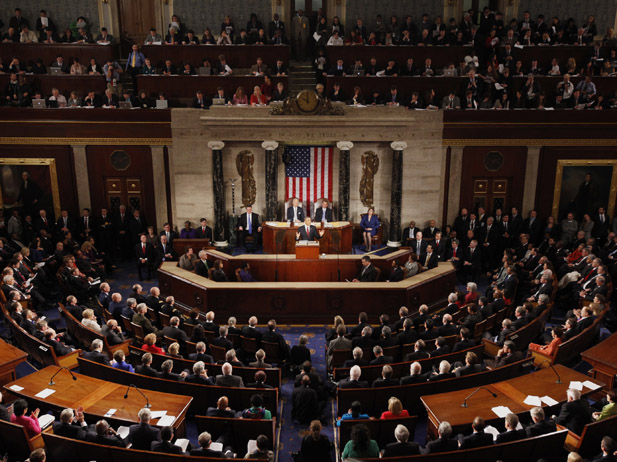By Mattie Duppler • National Review
There is now discussion of reviving earmarks: the practice, banned in the House of Representatives since 2010, of inserting funding for lawmakers’ pet projects into bills to secure their support. Earmarks epitomize the obsequious logrolling that makes Washington the most hated place in the nation (on earth?) — and their absence has proved crucial to the Republican effort to restrain government spending, one of the great untold success stories of the past eight years. That Republicans would even suggest earmarks should be restored reveals at best an unsophisticated grasp of spending mechanisms, and at worst a complete abandonment of the victories the party has scored in restraining Washington’s spendthrift instincts.
It is often forgotten what two years of the Obama-Pelosi-Reid triumvirate augured for the size of government. Federal spending, which had generally held steady around 20 percent of GDP in the modern era, was projected to rise to more than 26 percent of GDP by 2020 after just two years of Democratic control.
House Republicans, driven to power by Americans who recoiled at this looming threat of unstable government growth, promised to turn this around. And they did: Through dogged spending cuts in bimonthly continuing resolutions, and then with the imposition of budget caps in the Budget Control Act in August of 2011, Republicans erased the spending legacy of the Pelosi- and Reid-led Congress, which only a few years earlier had been eyed wearily as the new normal. Today federal spending stands at about 21 percent of GDP.
Another important development that aided Republicans’ fiscal revolution: durable changes to House rules that started to tilt the institution’s operational bias away from spending and in favor of more restraint. Notably, the banning of earmarks.
It is more than a little uncanny that Speaker Paul Ryan now presides over the discussion of whether earmarks should return, having claimed the speaker’s gavel only after this predecessor, John Boehner, was pressured to relinquish it after being deemed unsatisfactorily conservative by factions of the conference. Eliminating earmarks was one of Speaker Boehner’s lifelong goals; he described it as “one of the best decisions I ever made.”
The sin of earmarks is not just that they constitute more spending, but also that they grease the wheels of the legislative tracks to get unpopular bills passed. Speaker Boehner understood this and fought to eliminate the practice, first in the Republican conference and then across the entire House. The fiscal discipline needed to restore solvency to federal budgets is simply not possible as long as the temptation of earmarks remains. Indeed, the initial continuing resolutions that catalyzed the Republican victories in dialing back spending in 2011 would never have been possible had members’ resolve been tested by earmarks.
Institutional memory here is limited; an overwhelming majority of today’s House Republicans were elected after earmarks were eliminated, and as a result they entertain fantastical notions of their real impact. As Republican Study Committee chairman Mark Walker points out in the Wall Street Journal this week, earmarks imposed additional garish burdens on legislating:
This bad idea is gaining traction partly because most House Republicans took their seats after the 2011 ban. They have little memory of past abuses like Alaska’s “Bridge to Nowhere.” They never had to endure the meetings where lobbyists pressured them to grovel before the Appropriations Committee for pork. The moniker “cardinals” for subcommittee chairmen is an anachronism; they no longer have unilateral powers to redirect billions in spending on a whim.
These members cut their congressional teeth in an era of divided government, one where the legislative branch’s constitutional authorities was consistently routed by a hostile administration. All they know is the frustration of dealing with an executive branch that shows contempt for legislative authority and does everything it can to upend the constitutional balance between branches. Their irritation is well understood, but it would be short-sighted to undo proven spending reforms based on this limited experience alone.
Congress, of course, does not lack the tools to retake its Article I responsibilities; in many cases, it just lacks the will. After all, a not-insignificant amount of spending continues each year, despite the fact that it is Congress’s authority to oversee it. The Congressional Budget Office estimates that over $300 billion is appropriated each year for programs and agencies that do not have congressional authority to operate. These “zombie programs,” as Representative Cathy McMorris Rodgers called them when she introduced a bill in 2014 to end this abuse, are allowed to live beyond their expiration dates simply because the committees under whose jurisdiction they preside have not done the hard work of reviewing and renewing their utility.
Any member who sits on a committee that oversees unauthorized programs should be careful about spilling crocodile tears over earmarks.
Just last year, the House accomplished generational tax reform. It passed a bill to repeal and replace Obamacare. It has undertaken countless measures that complement the president’s deregulatory agenda. It has confronted the public-welfare concerns of human trafficking and opioid abuse head-on. It voted to modernize the military. And it did it all without earmarks.
Speaker Ryan is in a difficult position, trying to manage a conference with competing ideas about how to get its business done. Members who remember the damage earmarks caused, both to the business of politics and to the nation’s bottom line, should educate their colleagues that earmarks are not a silver bullet. The conference should remember Speaker Boehner’s warning in his first floor speech on the subject when he was a freshman member of Congress: “The American people are fed up with this kind of politics. We better wake up before it’s too late.”
Republicans have much to show for their leadership on fiscal prudence these past eight years. It would be a grave mistake to turn their backs on it now.
